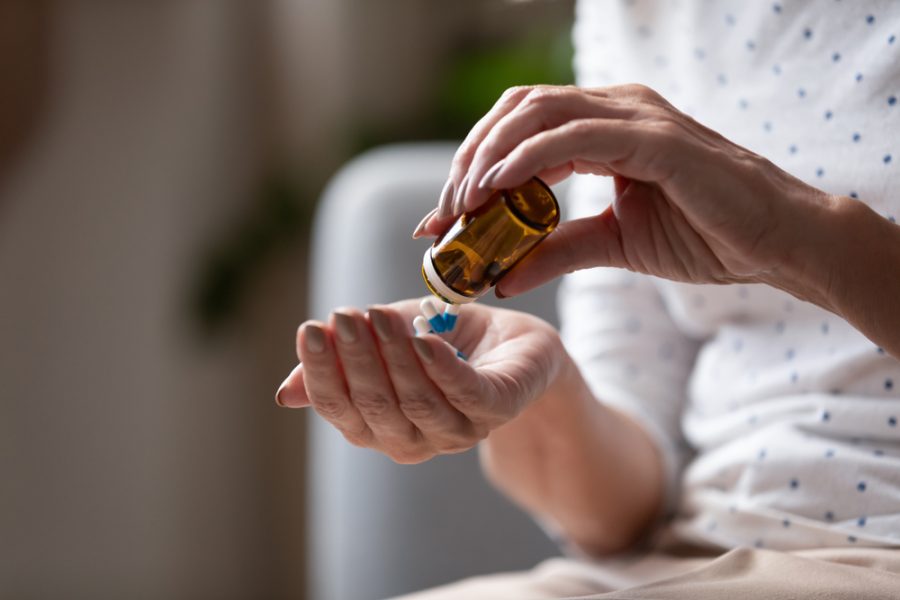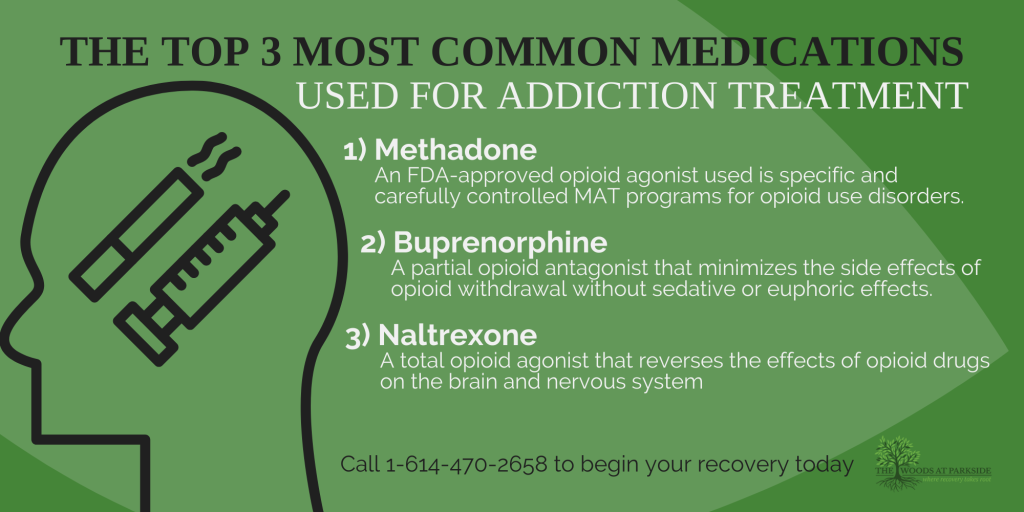
If you are addicted to alcohol or drugs, medication can potentially help you safely detox from drugs and minimize withdrawal symptoms. At Woods at Parkside, we offer medically supervised detox services, which helps you successfully start your path to recovery in a safe manner.
The Woods at Parkside can help you learn about medications for addiction treatment. Contact us today to ask about MAT services.
The idea of medication for addiction treatment may seem confusing, even counterproductive. After all, the idea of using a “drug” to help you overcome drug or alcohol addiction may seem like trading your addiction for another type of dependency. However, medically assisted detox is a proven method for helping people with a wide range of addiction treatment needs safely and effectively detox from substances. Many medications for addiction treatment have received approval from the Food and Drug Administration (FDA).
Table of Contents
What is Medication for Addiction Treatment?


Medication for addiction treatment or medically assisted detox is vital to many detox and addiction treatment programs. The first goal of medication assisted detox program is to stabilize your body and mind. The first days of quitting drugs or alcohol can be difficult. The withdrawal symptoms accompanying detoxing from different substances can begin within a few hours after the last dose of drugs and within 6 hours of your last drink.
Drug and alcohol withdrawal symptoms will cause various physical and emotional effects, which can be challenging to manage without treatment assistance. One of the critical benefits of medication assisted detox is that the medicines used in a medication assisted treatment program can help reduce the intensity of cravings and other unpleasant withdrawal symptoms.
Once medication assisted detox has helped to stabilize your physical and emotional symptoms, it can help you get the traction you need to take steps towards achieving sobriety and recovery. As you work to control your withdrawal symptoms, such as cravings and headaches or emotional symptoms including anxiety and depression, medically assisted treatment reduces your symptom severity so you can focus on the most critical part of treatment: Taking the first steps towards healing and recovery.
What Are the Most Common Medications for Addiction Treatment?


Several types of medications are used in medication assisted treatment for addiction. A few of the most common are listed below.
Methadone
Before the increased use of Suboxone as a key medication in MAT programs, methadone medication-assisted treatment was also a primary part of many MAT programs for opioid addiction. Methadone first received approval from the Food and Drug Administration (FDA) in the late 1940s. With use and time, medical and mental health providers noticed various potentially dangerous side effects connected to methadone use. Examples include high overdose rates, abuse, and addiction.
Data from 2010 shows that as many as one in three (approximately 33%) opioid-related deaths were linked to methadone misuse. Methadone is classified as a full opioid agonist. When used, the drug binds to the opioid receptors in the brain, activating them. This action produces a chemical response that leaves the user more vulnerable to methadone dependency. Methadone is still used in specific and carefully controlled MAT programs for opioid use disorders.
Buprenorphine
Buprenorphine is an opioid drug that is stronger than morphine. However, its effectiveness as an opioid agonist for addiction treatment makes it beneficial in a MAT program. Buprenorphine is a partial opioid agonist in the brain, working to keep other opioids from affecting your body by binding to the opioid receptors in your brain and nervous system.
This helps you wean off opioids while minimizing the side effects of opioid withdrawal. Buprenorphine is unlikely to cause the intense sedative and euphoric effects caused by opioid drugs. However, it does help satisfy cravings and suppress opioid withdrawal symptoms. As part of a medication-assisted substance abuse treatment program, buprenorphine addicts in recovery fully engage in therapy and other rehab activities.
Naltrexone
Naloxone is another medication used in medication-assisted treatment centers and other medical environments, such as emergency rooms, to reverse the effects of an opioid overdose. Like methadone, Naloxone is a total opioid agonist. It blocks and reverses the effects of opioid drugs on the brain and nervous system. Naloxone is an ingredient in Suboxone.
As part of a MAT program, it prevents people from overdosing on Buprenorphine (the other component of Suboxone). Naloxone also minimizes the risk of relapse by preventing the pleasant sensations many experience when using opioids. It is also effective at reducing the intensity of symptoms related to alcohol detox in a MAT substance abuse program.
What About Alcohol Withdrawal Medications?
The above medications are primarily used as part of opioid detox programs. There are also medications that are ideal for helping manage the symptoms that often accompany alcohol withdrawal.
Acamprosate
Acamprosate, or Campral, is a medication approved by the FDA for the treatment of alcoholism. Acamprosate is one of three FDA-approved medications used to treat alcohol use disorders. It reduces the brain’s dependence on alcohol by changing how the brain produces and releases neurotransmitters.
Disulfiram
Disulfiram, or Antabuse, is often used during alcohol detox. Disulfiram interferes with how your body breaks down alcohol. Specifically, it produces a negative and unpleasant physical effect if combined with alcohol.
Is Using Medication for Addiction Treatment Effective?
Studies show the success rate of medication-assisted treatment is substantial. Because MAT reduces the intensity and challenges associated with cravings, it helps addicts in recovery to focus on overcoming addiction. Some studies suggest the success rate of medication-assisted treatment is up to 90% at the two-year mark.
Despite the proven success rate of medication-assisted treatment, substance abuse medication-assisted treatment options are not as well utilized as they could be. MAT statistics from a survey conducted in 2019 suggest less than 35% of adults seeking treatment for an opioid use disorder who could benefit from a MAT program received treatment for opioid addiction in the past year.
The Importance of Addiction Treatment
Using medication for addiction treatment is only part of a comprehensive treatment plan. Although medications used during detox can help reduce the intensity and severity of a range of detox symptoms, they do not address the underlying causes of addiction. Several factors often contribute to why someone first uses drugs or alcohol. Among the most common include stress, trauma, eating disorders, and various other co-occurring mental and physical health conditions.
The only effective way to heal and overcome a substance use disorder is to follow detox with a comprehensive treatment program. As part of an individualized, comprehensive therapy program at The Woods at Parkside, our providers will work with you to help you examine and better understand how drugs and alcohol are often used as a form of self-medication.
Also, as part of treatment, you will learn more about coping tools and skills you can use after your primary treatment program ends when faced with stressors and relapse triggers. Learning and practicing these tools as a part of a residential, intensive outpatient, or day treatment program will provide you with the coping mechanisms you need to maintain lasting sobriety and long-term health and wellness.
Our Ohio mental health and addiction treatment services program aims to create an environment where you can focus on regaining your physical, mental, and spiritual being. Let us help you take the first steps towards putting the challenges of drug and alcohol addiction in the past.
To learn more about how medications for addiction treatment can help you through the early stages of addiction recovery, contact The Woods at Parkside today.
The post Medication for Addiction Treatment: What You Need To Know appeared first on The Woods At Parkside.
Source
Original Author: Beacon User

